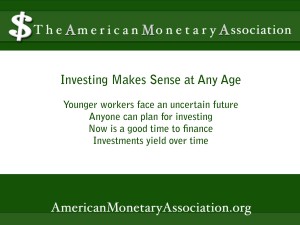 For new college graduates and young professionals just starting their careers, the US employment picture is improving but still far from secure. Many new college graduates face increasing competition for jobs, with large numbers of professionals forced to settle for lower paying or part-time work outside their field – if they can get jobs at all. And unlike in previous generations, working people in most professions can expect to change jobs, if not entire careers, multiple times in the course of their working life. All these factors combine to make the road to retirement a particularly rocky one. Investing may
For new college graduates and young professionals just starting their careers, the US employment picture is improving but still far from secure. Many new college graduates face increasing competition for jobs, with large numbers of professionals forced to settle for lower paying or part-time work outside their field – if they can get jobs at all. And unlike in previous generations, working people in most professions can expect to change jobs, if not entire careers, multiple times in the course of their working life. All these factors combine to make the road to retirement a particularly rocky one. Investing may
be the answer – but many of these young potential investors worry about having enough money and experience to avoid making risky mistakes.
Although fiscal experts maintain that it’s never too early to begin planning for retirement, changes in Social Security and pension arrangements mean that younger workers can expect to work longer – and harder – to save enough for a comfortable retirement. Fewer employees are offering full pensions, and healthcare costs may nibble away at individual savings accounts.
That’s where investing can help. An article published in the spring of 2012 on the investing site Bigger Pockets discussed the myths keeping younger people from starting an investing career in income property. Among these myths: investing is for people with more experience and knowledge, I don’t have the money, and it’s too risky.
Interestingly, these are the same doubts voiced by older people considering the same path. But although the image of a successful investor usually involves mature-looking people in business clothes, people of any age can start with a modest investment and expand holdings over time. And as Jason Hartman points out in his 10 Commandments of Successful Investing, acquiring the necessary knowledge to make good investing decisions is the first step for any would-be investor regardless of age.
It’s also important to create a team of qualified supporters, starting with an experienced investment advisor. Knowledgeable contractors and repair people, as well as real estate and tax professionals, can also help a new investor avoid pitfalls and make wise decisions about purchasing and maintaining properties.
New investors of all ages worry about finding the money to start investing. But with the current low-interest rates and readily available foreclosed properties still entering the market, a young investor can buy that first property with a minimal down payment and, with relatively minimal credit background, qualify for certain types of loans, such as that typically don’t rely solely on credit scores for approval. Private lenders and programs tailored to specific types of investors can also help.
Risk is inherent in investing. But as Jason Hartman points out, investing in income property with a fixed-rate loan is among the least risky investments to make. The investor’s own money stays in the bank, rental income covers loan payments and holding the property allows for a greater return over time.
There’s no magical age to begin thinking about investing in income property. Younger and more mature investors share the same concerns about taking the first step. But with knowledge, planning, and good advising, people at the start or end of their careers – and anywhere in the middle – can create an income stream from income property investing.
The American Monetary Association Team

